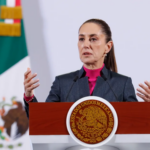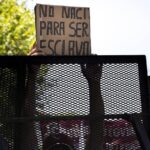
Outside, buses from the ultra HazteOir association with the face of Pedro Sánchez and posters of “la Rosa Nostra” and “el capo, resignation.” Inside, there are moments when the International plays over the public address system. But above all there are ministers, socialist leaders, activists and more than 1,000 delegates willing to wage a determined fight against the lawfarea term that was previously difficult to hear from a socialist, but which almost everyone now speaks openly. The 41st Federal Congress of the PSOE will not go down in history either for having renounced Marxism (1979) or for the implementation of gender quotas (1988), or for the approval of the primaries (2000), or for the transition to sanchismo (2014). 2024 will be the conclave in which the PSOE decided to rearm itself against what it calls the “mud industry.”
Its leaders have conspired to get out of resistance mode and go on the offensive in the face of a wide-ranging operation “that only seeks to take down Pedro Sánchez.” What we do not yet know is whether, when the years pass and the current President of the Government is no longer President, a Luis María Anson will appear in Spain who recognizes as the journalist did in 1998 — two years after González left La Moncloa. — that to finish with the former president of the Government “the stability of the State was touched.” Or that a sector of the press, united in what was known as “the crime syndicate” pressured the judicial world to “stoke a fire that favored the erosion of the president (…) An operation to harass and demolish the that some joined from the honest conviction that it was a service to the democratic system.”
And although Pedro Sánchez is not Felipe González and the Spain of 1993 is not that of 2024, there are situations that inevitably remind us of those years, as the most veterans of the PSOE remember. Then, as now a year and a half ago, general elections were held. Then, like a year and a half ago, the right took it for granted that, after almost three decades of socialist governments, their time had come. Then, like a year and a half ago, the PP lost the elections against all odds. So, as it has been a year and a half since Sánchez revalidated the Government, the campaign of harassment and demolition against the ruling left is an indubitable fact.
As we said, the PSOE has not met in Seville to review its ideological corpus or to unite criteria on regional financing, which is the issue that has confronted them the most, along with the pacts with the Catalan independence movement, in recent times. . This situation was resolved with a transaction that serves the same purpose for Castilla-La Mancha as it does for Catalonia. Precisely, if there is a delegation that has arrived at this congress showing off what the rest of the territories long for, it is the Catalan one. Today, the PSC, with Salvador Illa as president of the Generalitat, is a haven of organic peace that other federations would like for themselves. “We have come to not make noise and give encouragement,” was heard among the Catalan delegates.
At the center of the target of several judicial summaries, the socialists are not up for too many emotions, but if there was an emotional moment on the first day of the conclave, it was the rebirth of the delegates to former presidents Manuel Chaves and José Antonio Griñán, who For the first time they attended a party congress since the ruling that convicted them for the ERE case. The PSOE proposed, after the Constitutional Court (TC) reviewed their sentences, to rehabilitate them and did so this Saturday with a great ovation when both entered the plenary session.
Swords out of tune
The president of the 41st Federal Congress, Juan Espadas, wanted to highlight during his speech their work as “public servants” and drew loud applause from the attendees, sitting in the front row. It was the only part of Espadas’ speech that the delegates appreciated because the rest, as a representative from Córdoba complained, was like “the 100-day war told day by day and without any interest.” In the Andalusian federation, echoes of a break with Espadas are beginning to be heard before the next regional congress.
Espadas exceeded his role as host and, instead of sticking to the protocol greeting and opening the conclave, he marked the longest, most tedious and most criticized speech of the day. Long, inappropriate and because it seemed like a speech to vindicate himself, in the face of so much internal criticism, as the leader of Andalusian socialism. Nor did I like that, being present there with Griñán and Chaves, he ignored Susana Díaz, whom he avoided mentioning. “One thing is competition and internal rivalry and another is education and good manners,” a militant from Granada said.
Espadas demonstrated greater clumsiness when a representative from the Socialist Left current asked to speak, before the approval by assent of the management report of the current leadership, to talk about the lack of internal debate and the president of the conclave limited himself to saying that he took He noted this, but denied him the opportunity to explain. “We wanted to take advantage of this point to say that we would like, regardless of the vote for or against, to express what we believe that at this time has not been within the organizational chart of our party developed as we believe it should have been developed, with more participation,” said the representative of the Socialist Left. “Thank you, partner. Your intervention will be recorded,” Espadas sent him.
Before, Santos Cerdán, who will continue to lead the Organization Secretariat in the new direction, worked hard in the most political speech that had ever been heard from him. “There is an industry of hate, generating sludge, noise and bile without stopping with the aim of generating chaos that benefits those who do not believe in democracy or institutions.” A campaign in which for the first time, and explicitly, a socialist included the judges. “They are the same old lies, but spread quickly with loudspeakers on prime-time TV programs, on radio programs, on digital platforms, in talk shows, on social networks, but also in court,” he added.
He thus called on the entire party to face the “reactionary tsunami” and focus on the management of the Government as a response until 2027, which is the date on which the Secretary of Organization placed the end of the legislature as he does every time he has the opportunity. also Pedro Sánchez. “Facing the tidal wave of hate and misinformation challenges us all,” he encouraged them. The message was clear and was repeated during the first day in the groups and in all the interventions. In addition to Cerdán, María Jesús Montero spoke of “a corrosive opposition,” of an “operation of harassment and demolition” that has turned the political climate “unbreathable.”

And if the slogan was not to lower our arms in the face of it, the background noise that flew over the entire conclave was the revelations of Juan Lobato that point to La Moncloa as a possible leaker of a document with confidential data of Isabel Díaz Ayuso’s boyfriend in the who confessed to three crimes and offered the Prosecutor’s Office an agreement to avoid a prison sentence. On Friday the topic of conversation of all the delegates and cadres, but this Saturday the PSOE made a clear demonstration that a dead king, a king appointed to turn the page on the already former secretary general of the Madrid socialists.
Óscar López has already activated the candidate mode against Ayuso and made an effort with accredited informants to guide the debate where, in his opinion, it should be, which is in the tax fraud of 350,000 euros recognized by the president’s partner, after the charging a commission of two million euros for the sale of masks in the middle of the pandemic. Something that has become a kind of black hole for the socialists and that can end with the accusation of López’s former chief of staff, Pilar Sánchez About. “Ayuso’s boyfriend committed a crime. Ayuso’s chief of staff leaked a lie. And now they want the PSOE to give the explanation. It is curious, it is paradoxical,” declared the Minister for Digital Transformation and the Public Service, who has been one of the people most sought after by delegates, observers and guests at this 41st Congress of the PSOE.
No one doubts anymore that he will be the one who will face Ayuso in the next regional elections and neither that his speech and his way of acting in front of the MAR factory will be very different from that of a Lobato who is already dead and buried. And the day after his resignation, those close to the former secretary general met to consider the possibility of promoting an alternative candidacy to López or even having Lobato himself appear in the primaries to regain the leadership. There was not enough water or support to confront López. And now sure of a single list, the minister lavished himself in conversations with the Madrid delegation and in statements. “I’m not intimidated by Miguel Ángel Rodríguez,” he stated while defending the need to regenerate political life in this country “and put an end to this pit of corruption and dirty politics that Ayuso has turned Madrid into.” He knows and is not afraid that he will tread on the swampy terrain over which everyone who stands up to him is dragged from the Puerta del Sol.

All on a day in which the greatest expectation was the visit of the President of the Government’s partner, Begoña Gómez, who came to the Congress facilities late in the afternoon. In an informal conversation with journalists, Gómez said she felt “very calm” regarding her judicial situation while taking a mass bath among the socialist militancy whose affection, she has acknowledged, “comforts” her.
Before, in the middle of the afternoon, the only important voice that sounded different in the entire conclave was that of Emiliano García Page when he said that “it is not advisable to put your hand in the fire for anyone because you will surely burn.” He thus responded to the forceful statement of Vice President Montero, who a few days ago used that expression to dispel any shadow of suspicion about her chief of staff and about Cerdán, whom Aldama mentioned in his judicial statement as alleged beneficiaries of the payment of commissions.
At least, the president of Castilla-La Mancha agreed with the rest that what is experienced on the M-30 in Madrid “is a meat grinder” and “is not what happens in the rest of the country.” He also wanted to emphasize to mark distances with the leadership that “victimhood is always the last resort of any political project, although it can have some logic when it is preceded by a tremendous dose of self-criticism.” And the fact is that “the Spaniards would see it well if the PSOE said at some point outwardly that we could be wrong to give greater credibility to all the unfounded accusations they are making against us.” Page playing Page.
Source: www.eldiario.es

